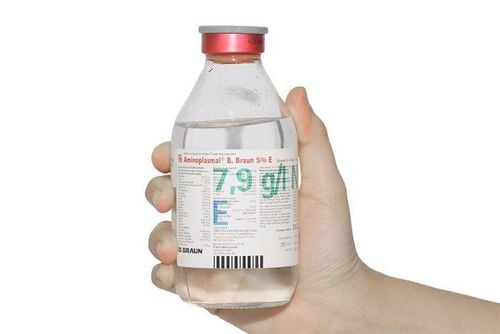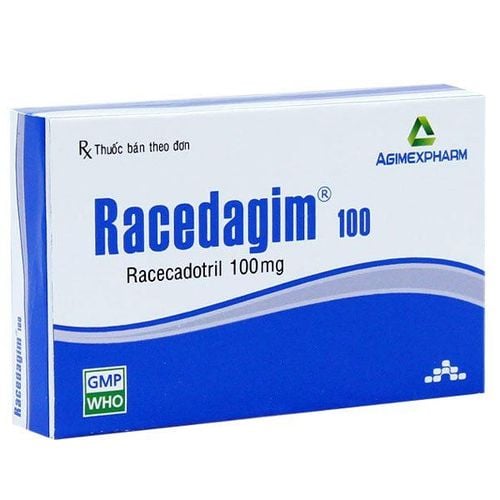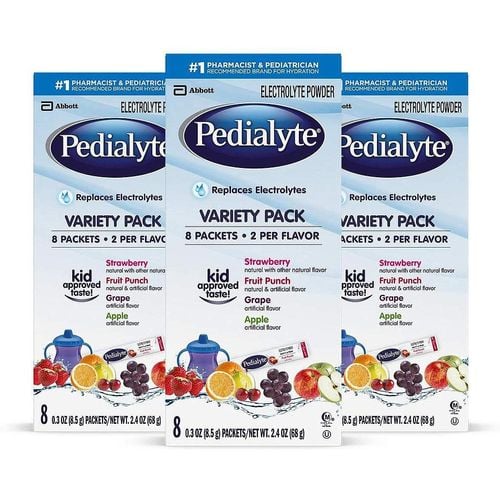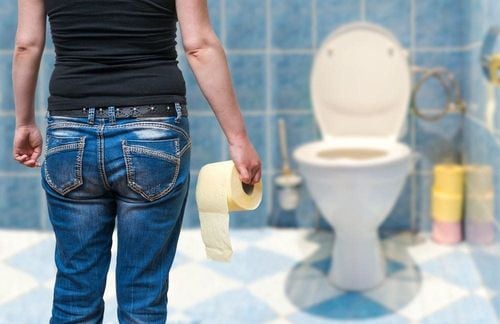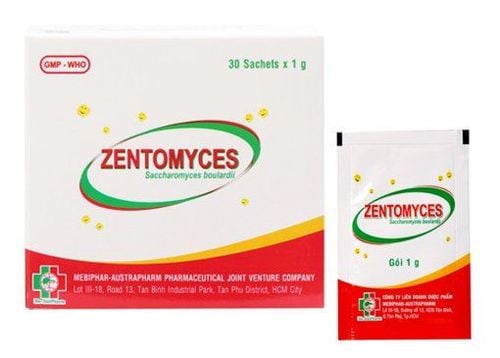This is an automatically translated article.
Electrolytes found in foods and drinks help fuel you, keep your muscles working, and potentially even improve your performance. If you're an endurance athlete, exercise for many hours, exercise in hot temperatures or sweat a lot, you may need to replenish your electrolytes regularly, says the nutritionist. than. Continue reading below to know more about electrolyte-rich drinks that can help you.1. What are electrolytes?
Electrolytes are minerals including sodium, potassium and magnesium. They are found in the tissues, blood, and other body fluids and are important for nerve and muscle function, blood pressure regulation, and hydration. Some drinks are naturally rich in electrolytes, while others undergo special formulation to provide electrolytes to the body.The term electrolyte refers to the fact that an electrolyte is a substance that has an electrical charge. Many bodily functions depend on a small electrical current, which supplies electrolytes. Most people can maintain a healthy electrolyte balance with a diet rich in electrolytes-rich foods and beverages. Others, such as professional athletes as well as those who are sick and dehydrated, need electrolytes to maintain this balance. Many drinks, including drinks that people can make at home, are rich in electrolytes.
The term electrolyte or electrolyte refers to chemicals that carry an electrical charge when dissolved in water. In terms of nutrition, it refers to minerals that play an important role in the body. Electrolytes occur in tissues, blood, urine, and other body fluids. These include:
Sodium Calcium Potassium Chloride Phosphate Magnesium These minerals are important for many bodily functions, such as keeping the body hydrated, controlling the body's nervous system, and balancing blood levels. acidity and basicity (pH) of the body.
Electrolytes can also be defined as minerals that conduct electricity when mixed with water. They help regulate a variety of your body's most essential functions, including nerve signaling, pH balance, muscle contraction, and hydration. The main electrolytes that our bodies use to perform these important functions are sodium, potassium, magnesium, calcium, phosphorus, chloride, and bicarbonate.
The concentration of electrolytes present in the blood and other body fluids is maintained within a very narrow range. If the body's electrolyte levels become too high or too low, serious health complications can arise. The daily loss of electrolytes and fluids occurs naturally through sweat and other waste products. Therefore, it is important to regularly supplement them with a diet rich in minerals.
However, certain activities or situations - such as heavy exercise or episodes of diarrhea or vomiting - can increase the amount of electrolytes you lose and may warrant replenishment of drinks electrolytes into your routine.
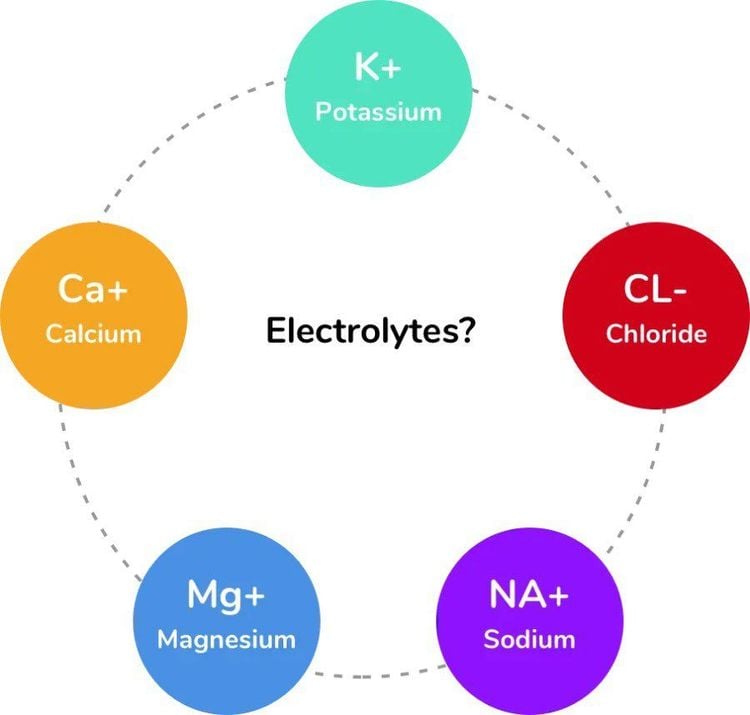
Chất điện giải chính là các khoáng chất gồm có natri, kali và magie
2. 8 electrolyte-rich drinks
2.1. Coconut water Coconut water is rich in electrolytes. Over the past few years, it has become one of the most popular beverages on the market and is now bottled and sold worldwide. Coconut water is naturally low in sugar and high in electrolytes, including sodium, potassium, calcium and magnesium.With 46 calories per cup (237 ml), it's also a healthier alternative to traditional sodas, juices and sports drinks
2.2. Milk When it comes to electrolyte drinks, cow's milk is often overlooked. But contrary to popular belief, milk can be used more than cereal or coffee for breakfast and also used to replace electrolytes.
In addition to a good source of electrolytes like calcium, sodium and potassium, milk also provides a healthy combination of carbs and protein. These two macronutrients can help you refuel and promote the healing of muscle tissue damage after a workout.
Some research suggests that these characteristics could make milk a better post-workout drink than many commercial sports drinks - and at a much lower cost.
Since milk's benefits are boosted by its electrolyte, carb and protein content, we can choose whole, low-fat or skim milk, which will depend on our personal preferences. Nutrition experts also note that cow's milk may not be the right choice for everyone - especially those on a vegan diet or those with lactose intolerance since milk.
If you are lactose intolerant but still want to include milk in your recovery regimen, choose the lactose-free dairy version. Meanwhile, if you follow a vegan diet or have a milk protein allergy, you should avoid dairy altogether.
While plant-based alternatives probably won't provide the same benefits as cow's milk, some studies have shown that the protein in soy milk can aid in muscle repair. while providing the same electrolyte profile as cow's milk
2.3. Watermelon juice and other juices Although the name may suggest otherwise, watermelon juice is simply the juice that comes from the watermelon fruit. One cup (237ml) of 100% watermelon juice provides nearly 6% of the recommended daily requirement (DV) for potassium and magnesium while providing small amounts of other electrolytes, such as calcium and phosphorus.
Watermelon juice also contains L - citrulline. When used in supplemental doses, this amino acid can help enhance oxygen transport and increase athletic performance. However, current research suggests that the amount of L-citrulline in regular watermelon juice is probably not enough to have any measurable impact on exercise performance.
Other juices can also be a good source of electrolytes. For example, orange juice and tart cherries also contain potassium, magnesium, and phosphorus. Plus, 100% fruit juice serves as an excellent source of vitamins and antioxidants.
One of the main drawbacks of using fruit juice as an electrolyte replacement drink is that it often has a low sodium content. Prolonged sweating and trying to rehydrate with a sodium-free beverage can cause blood sodium levels to drop deeply. To reduce this risk, some people prefer to make their own sports drinks by combining Mix with fruit juice, salt and water.

Nước dừa nhiều chất điện giải và là thức uống được nhiều người yêu thích
If you're dealing with an upset stomach and want to replace lost electrolytes, smoothies can be easier to digest and palatable than many of the foods mentioned above. Smoothies are also a great option for those looking for a post-workout recovery drink. Not only can they replace lost electrolytes, but they're also a good way to help support muscle tissue growth and repair if you take some protein-rich supplements.
However, a smoothie might not be the best choice if you're looking for an electrolyte drink to consume after heavy or prolonged exercise. That's because it has the potential to make us feel too full to continue comfortably completing our workouts. So it's probably best to drink a smoothie before or after each workout at least an hour
2.5. Electrolyzed Water Infused water can be a great, low-calorie way to replenish electrolytes and keep our bodies hydrated. However, not all electrolyte drinks are created equal. In the United States, most standard tap water contains about 2 - 3% of the body's daily needs for certain electrolytes, such as sodium, calcium, and magnesium.
Interestingly, some brands of electrolyte-fortified bottled water can be very expensive and don't contain more electrolytes - in some cases even less. That said, some brands are specifically designed to support hydration and replace minerals, and contain higher amounts of electrolytes. These are more likely to be worth the money, depending on why you're drinking an electrolyte drink in the first place.
Experts analyze that electrolyte water has the potential to contain sugar, as much of it is used to replenish carb stores during prolonged exercise. You can also try adding sliced fruits or herbs to your water bottle to create your own flavored, electrolyte-infused water.
2.6. Electrolyte Tablets Electrolyte Oral Tablets are a new method applied to help everyone to be able to replace water and electrolytes if they want, wherever they are in the easiest way. All we have to do is drop one of the pills in some water and shake or stir until we run out. Most electrolyte tablets contain sodium, potassium, magnesium, and calcium - although the exact amount can vary depending on the brand. They also tend to be low in calories, with little or no added sugar, and are packed with unique fruit flavors. Some brands of electrolyte tablets may also contain caffeine or a vitamin supplement, so be sure to check the label if you want to avoid any of those extra ingredients.
Currently, electrolyte tablets are no longer strange and have appeared at many sporting goods stores nationwide or ordered at reputable stores on social networking sites.
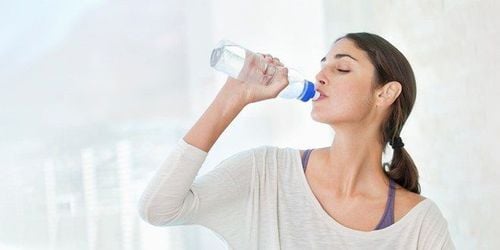
Đồ uống thể thao có chứa nhiều chất điện giải
However, commercial sports drinks also contain some major drawbacks. They tend to be loaded with artificial colors, flavors, and added sugars, which aren't absolutely necessary for anyone - whether you're an athlete or not. In fact, a 12-ounce (355ml) serving of Gatorade or Powerade contains more than 20 grams of added sugar. That's more than half of the recommended daily intake for sugar. Plus, the sugar-free versions may not be a better alternative.
Although they contain no added sugar and have fewer calories, they often contain sugar alcohols or artificial sweeteners. These sweeteners can contribute to unpleasant digestive symptoms, such as bloating and indigestion, in some people.
A simple way to avoid unwanted ingredients in sports drinks is to make your own. Simply use a combination of 100% fruit juice, coconut water and a pinch of salt to create a healthier electrolyte drink without artificial ingredients and added sugar.
2.8. Oresol Oresol is a commercial electrolyte drink that is marketed for children, but it can also be used by adults. Oresol is used to supplement rehydration when we are dehydrated due to diarrhea or vomiting. It is much lower in sugar than regular sports drinks, and sodium, chloride, and potassium are the only electrolytes it includes.
Each contains only 9 grams of sugar, but the flavor options also contain artificial sweeteners. If you want to avoid artificial sweeteners, choose a version of oresol without other flavors.
Electrolytes are minerals that help your body perform many important functions, such as hydration, muscle contraction, pH balance, and nerve signaling. To function properly, your body must maintain adequate amounts of fluids and electrolytes at all times. Beverages such as coconut water, milk, fruit juices and sports drinks can all contribute to water and electrolyte balance. For most people, a balanced diet and enough water are enough to maintain electrolyte levels. However, some circumstances may warrant the use of electrolyte drinks, especially if you are experiencing rapid fluid loss due to sweating or illness. Drinking plenty of water and watching for early signs of dehydration can help you determine if adding electrolyte drinks to your routine is right for you.
Please follow the website ( www.vinmec.com ) for more information on health care instructions, which we will update regularly.
Please dial HOTLINE for more information or register for an appointment HERE. Download MyVinmec app to make appointments faster and to manage your bookings easily.





